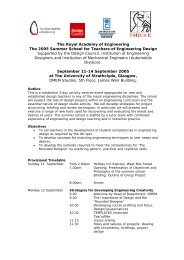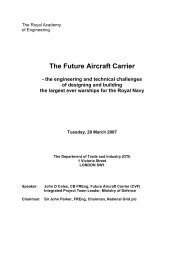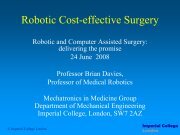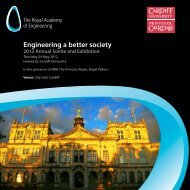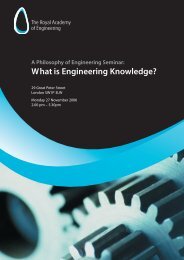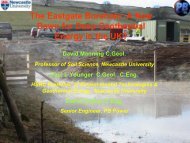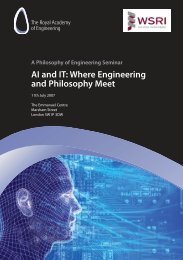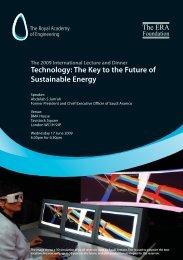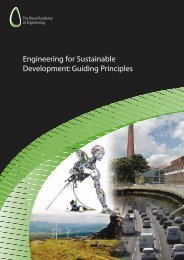Engineering Ethics: Do engineers owe duties to the
Engineering Ethics: Do engineers owe duties to the
Engineering Ethics: Do engineers owe duties to the
You also want an ePaper? Increase the reach of your titles
YUMPU automatically turns print PDFs into web optimized ePapers that Google loves.
The Lloyd’s Register Lecture<br />
ethical principles" and <strong>the</strong>re is evidently a general consensus which sees <strong>the</strong> codes or rules as expressing<br />
an intention beyond that required by strict application of <strong>the</strong> law. Examples of specific requirements<br />
relevant <strong>to</strong> public <strong>duties</strong> are <strong>the</strong> following:<br />
• A member shall at all times so order his conduct as <strong>to</strong> safeguard <strong>the</strong> public interest, particularly in matters<br />
of Health & Safety and <strong>the</strong> Environment 8<br />
• A member shall:<br />
At all times take all reasonable care <strong>to</strong> ensure that <strong>the</strong>ir work and <strong>the</strong> products of <strong>the</strong>ir work constitute<br />
no avoidable danger of death or injury or ill-health <strong>to</strong> any person;<br />
Take all reasonable steps <strong>to</strong> avoid waste of natural resources, damage of <strong>the</strong> environment, and wasteful<br />
damage or destruction of <strong>the</strong> products of human skill and industry 9<br />
• Every corporate member shall….safeguard <strong>the</strong> public interest in matters of Health & Safety and<br />
o<strong>the</strong>rwise 10<br />
• Members of <strong>the</strong> Institution in <strong>the</strong>ir responsibility <strong>to</strong> <strong>the</strong> profession shall have full regard <strong>to</strong> <strong>the</strong> public<br />
interest 11<br />
• A member shall have full regard for <strong>the</strong> public interest, particularly in relation <strong>to</strong> <strong>the</strong> environment and <strong>to</strong><br />
matters of Health & Safety 12<br />
• A member when discharging his professional <strong>duties</strong> shall, if his professional advice is not accepted, take all<br />
reasonable steps <strong>to</strong> ensure that <strong>the</strong> person over-ruling or neglecting his advice is aware of <strong>the</strong> possible<br />
danger which he believes may result from such over-ruling 13<br />
It is difficult <strong>to</strong> see any justification for <strong>the</strong> existence of different sets of rules. At least <strong>the</strong>re may be<br />
discerned a number of common principles relating <strong>to</strong> health, safety and <strong>the</strong> environment, which can be<br />
linked <strong>to</strong> specific <strong>duties</strong> created by common law or statute. H<strong>owe</strong>ver, <strong>the</strong>re are two significant differences<br />
between <strong>the</strong> Codes of Conduct and <strong>the</strong> underlying legal principles:<br />
(a) no distinction or limitation is made in relation <strong>to</strong> <strong>the</strong> persons who might potentially suffer or be at risk<br />
in relation <strong>to</strong> <strong>the</strong> conduct of <strong>the</strong> Engineer;<br />
(b) <strong>the</strong> duty is placed upon <strong>the</strong> individual Engineer irrespective of his or her situation or status.<br />
It may also be noted that some at least of <strong>the</strong> rules contain express reference <strong>to</strong> <strong>the</strong> "public interest". This<br />
raises fur<strong>the</strong>r questions as <strong>to</strong> <strong>the</strong> scope of any such duty, where it is seen as extending beyond <strong>the</strong><br />
relatively clear issues of health, safety and <strong>the</strong> environment. For example, is <strong>the</strong> Engineer <strong>to</strong> have regard<br />
<strong>to</strong> <strong>the</strong> public interest in reliability of transport systems, where <strong>the</strong>se are provided by private corporations?<br />
As regards <strong>the</strong> public, <strong>Engineering</strong> Institutions perform a multiple role. On one hand, through <strong>the</strong>ir<br />
learned society function, <strong>the</strong>y represent <strong>the</strong> informed collective opinion of <strong>the</strong> profession; while in <strong>the</strong>ir<br />
qualifying role <strong>the</strong>y aim <strong>to</strong> maintain standards, including <strong>the</strong>ir Codes of Conduct. In promulgating rules<br />
and Codes of Conduct, <strong>the</strong>y must be taken <strong>to</strong> represent <strong>to</strong> <strong>the</strong> public that <strong>the</strong>ir members will be required<br />
<strong>to</strong> comply with such requirements, including safeguarding <strong>the</strong> public interest as regards matters of health<br />
and safety and <strong>the</strong> environment as well as more general issues. Institutions do not enjoy any degree of<br />
immunity or legal protection. 14 An Institution might be vulnerable <strong>to</strong> action in negligence for failure <strong>to</strong><br />
8 Institution of Mechanical Engineers, Rule 33.6<br />
9 Institution of Electrical Engineers, Rules 1 and 2.<br />
10 Institution of Structural Engineers, Code of Conduct, Rule I.<br />
11 Institution of Structural Engineers, Rules of Conduct, Rule I.<br />
12 Institution of Civil Engineers, Rules of Professional Conduct, Rule 3.<br />
13 Institution of Chemical Engineers, Rules of Professional Conduct, Rule 3<br />
14 Compare section 39 of <strong>the</strong> Arbitration Act 1996 which gives such immunity <strong>to</strong> arbitral institutions. An arbitra<strong>to</strong>r enjoys<br />
similar immunity.<br />
6 The Royal Academy of <strong>Engineering</strong>






